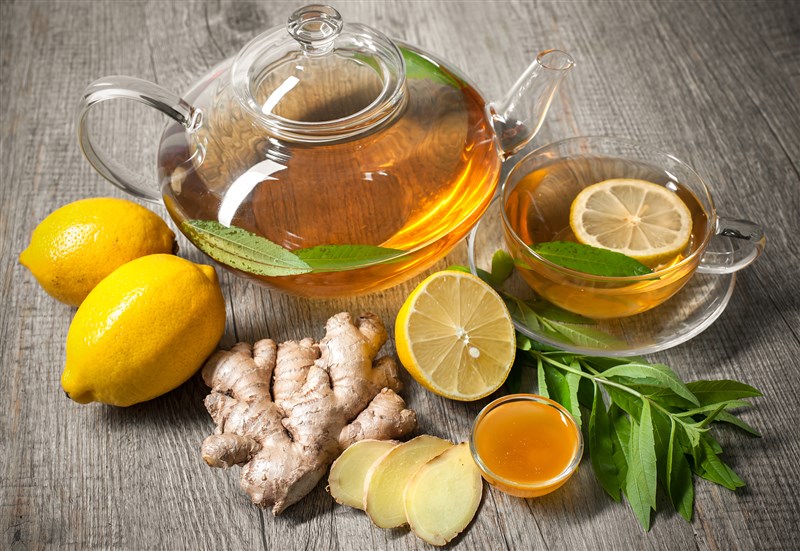Overview
Earthy with a kick, ginger has been used for millennia to spice food and treat ailments.
Ginger is native to Asia and is the flowering plant of the Zingiberaceae family. Its root, or stem, adds flavor to many types of cuisine, but is also an ancient herbal remedy for a host of ailments. Drinking ginger tea may help with everything from motion sickness to cancer prevention.
Here are just some of the known and suspected benefits of ginger tea.
One older study did show that ginger helped decrease motion sickness. If you suffer from queasiness in moving vehicles, trying ginger probably can’t hurt.
One older study did show that ginger helped decrease motion sickness. If you suffer from queasiness in moving vehicles, trying ginger probably can’t hurt.
Some experts believe the active components in ginger — volatile oils and phenol compounds called gingerols — can help relieve nausea caused by pregnancy, chemotherapy, or surgery. (Check with a doctor before using ginger after surgery, as it may interfere with clotting.)
Researchers suggestTrusted Source that ginger might be a worthwhile alternative to traditional anti-nausea drugs in people who are pregnant or undergoing chemotherapy and can’t have or tolerate the standard drugs.
Some experts believe the active components in ginger — volatile oils and phenol compounds called gingerols — can help relieve nausea caused by pregnancy, chemotherapy, or surgery. (Check with a doctor before using ginger after surgery, as it may interfere with clotting.)
Researchers suggestTrusted Source that ginger might be a worthwhile alternative to traditional anti-nausea drugs in people who are pregnant or undergoing chemotherapy and can’t have or tolerate the standard drugs.
A 2012 studyTrusted Source from Columbia University involving 10 overweight men found that drinking hot ginger tea (in this case, ginger powder dissolved in hot water) increased their feelings of fullness and reduced hunger.
A review of the researchTrusted Source suggests that ginger may be effective in managing obesity. However, most of the experiments have been rat studies, which suggest that ginger may help prevent obesity and obesity-related complications.
Ginger may help improve blood sugar control, reduce A1C, insulin, and triglycerides among people with type 2 diabetes, some researchTrusted Source suggests.
A 2012 studyTrusted Source from Columbia University involving 10 overweight men found that drinking hot ginger tea (in this case, ginger powder dissolved in hot water) increased their feelings of fullness and reduced hunger.
A review of the researchTrusted Source suggests that ginger may be effective in managing obesity. However, most of the experiments have been rat studies, which suggest that ginger may help prevent obesity and obesity-related complications.
Ginger may help improve blood sugar control, reduce A1C, insulin, and triglycerides among people with type 2 diabetes, some researchTrusted Source suggests.
Ginger has been used to treat inflammation for centuries and this practice now has a body of scientific evidence behind it. It’s been shown in several studies to help relieve pain from osteoarthritis of the knee in particular.
Ginger tea may also help alleviate headaches, menstrual cramps, sore muscles, and other types of pain.
Ginger has been used to treat inflammation for centuries and this practice now has a body of scientific evidence behind it. It’s been shown in several studies to help relieve pain from osteoarthritis of the knee in particular.
Ginger tea may also help alleviate headaches, menstrual cramps, sore muscles, and other types of pain.
Drinking ginger tea can have side effects, but you’re unlikely to experience problems unless you consume very large amounts.
People most often report gas, bloating, heartburn, and nausea as ginger-related side effects. Since ginger may lower blood pressure and may have a blood thinning effect, people on blood thinners or blood pressure drugs, should consult their doctor before consuming extra ginger.
Drinking ginger tea can have side effects, but you’re unlikely to experience problems unless you consume very large amounts.
People most often report gas, bloating, heartburn, and nausea as ginger-related side effects. Since ginger may lower blood pressure and may have a blood thinning effect, people on blood thinners or blood pressure drugs, should consult their doctor before consuming extra ginger.
Although you probably shouldn’t go overboard with it, ginger tea is an easy, delicious, and all-natural way to promote good health. In addition to the many health benefits, you can also simply sit back with a warm mug, breathe in, sip slowly, and enjoy.
Although you probably shouldn’t go overboard with it, ginger tea is an easy, delicious, and all-natural way to promote good health. In addition to the many health benefits, you can also simply sit back with a warm mug, breathe in, sip slowly, and enjoy.

























